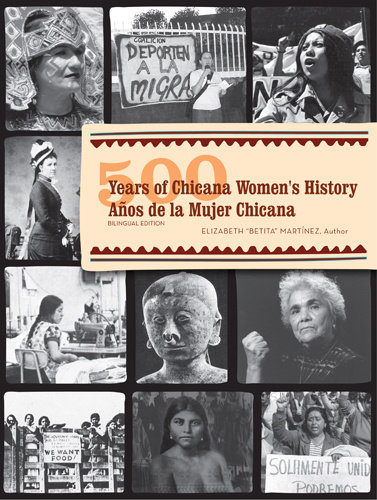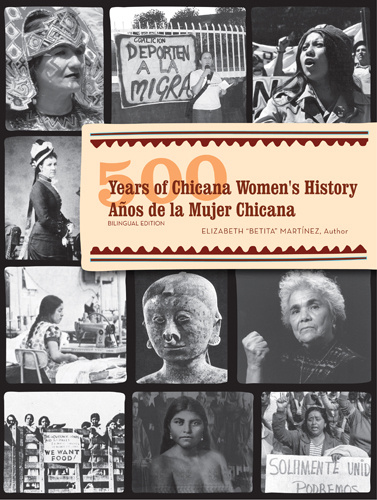
340 pages, 8 1/4 x 11
899 illust (866 halftones, 33 line)
Paperback
Release Date:06 Feb 2008
ISBN:9780813542249
500 Years of Chicana Women's History / 500 Años de la Mujer Chicana
Bilingual Edition
Rutgers University Press
Named the 2009 AAUP Best of the Best - Outstanding Book Distinction
The history of Mexican Americans spans more than five centuries and varies from region to region across the United States. Yet most of our history books devote at most a chapter to Chicano history, with even less attention to the story of Chicanas.
500 Years of Chicana Women’s History offers a powerful antidote to this omission with a vivid, pictorial account of struggle and survival, resilience and achievement, discrimination and identity. The bilingual text, along with hundreds of photos and other images, ranges from female-centered stories of pre-Columbian Mexico to profiles of contemporary social justice activists, labor leaders, youth organizers, artists, and environmentalists, among others. With a distinguished, seventeen-member advisory board, the book presents a remarkable combination of scholarship and youthful appeal.
In the section on jobs held by Mexicanas under U.S. rule in the 1800s, for example, readers learn about flamboyant Doña Tules, who owned a popular gambling saloon in Santa Fe, and Eulalia Arrilla de Pérez, a respected curandera (healer) in the San Diego area. Also covered are the “repatriation” campaigns” of the Midwest during the Depression that deported both adults and children, 75 percent of whom were U.S.–born and knew nothing of Mexico. Other stories include those of the garment, laundry, and cannery worker strikes, told from the perspective of Chicanas on the ground.
From the women who fought and died in the Mexican Revolution to those marching with their young children today for immigrant rights, every story draws inspiration. Like the editor’s previous book, 500 Years of Chicano History (still in print after 30 years), this thoroughly enriching view of Chicana women’s history promises to become a classic.
The history of Mexican Americans spans more than five centuries and varies from region to region across the United States. Yet most of our history books devote at most a chapter to Chicano history, with even less attention to the story of Chicanas.
500 Years of Chicana Women’s History offers a powerful antidote to this omission with a vivid, pictorial account of struggle and survival, resilience and achievement, discrimination and identity. The bilingual text, along with hundreds of photos and other images, ranges from female-centered stories of pre-Columbian Mexico to profiles of contemporary social justice activists, labor leaders, youth organizers, artists, and environmentalists, among others. With a distinguished, seventeen-member advisory board, the book presents a remarkable combination of scholarship and youthful appeal.
In the section on jobs held by Mexicanas under U.S. rule in the 1800s, for example, readers learn about flamboyant Doña Tules, who owned a popular gambling saloon in Santa Fe, and Eulalia Arrilla de Pérez, a respected curandera (healer) in the San Diego area. Also covered are the “repatriation” campaigns” of the Midwest during the Depression that deported both adults and children, 75 percent of whom were U.S.–born and knew nothing of Mexico. Other stories include those of the garment, laundry, and cannery worker strikes, told from the perspective of Chicanas on the ground.
From the women who fought and died in the Mexican Revolution to those marching with their young children today for immigrant rights, every story draws inspiration. Like the editor’s previous book, 500 Years of Chicano History (still in print after 30 years), this thoroughly enriching view of Chicana women’s history promises to become a classic.
A much-needed work: this bilingual history describing feminism's role in Chicana women's lives, from pre-columbian Mexico to now.
This history passionately shows that through unity and perseverance womencan make the world a better place for Chicanas/os and, indeed, for peoplefrom a diversity of backgrounds.
Elizabeth "Betita" Martínez is a widely known Chicana writer, activist, and lecturer. Now director of the Institute for Multiracial Justice in San Franciso, she has published six books, most recently De Colores Means All of Us: Latina Views for a Multi-Colored Century.
Acknowledgements
Introduction
The Story of La Chicana Begins
A New Invader Comes
Chicanas at Work Under U.S. Rule
La Revolución Mexicana
Let's Go To the U.S.
The Great Depression, Repatriation, Strike!
World War II
The Movement is Born
Life of a Farmworker Woman
Our Own Party
No a la Guerra en Vietnam
Work = Struggle
VIVA LA MUJER!
Mujeres who love women
Walking the Red Road
Culture contains the seed...
Today's Writers
Música, Teatro, Film,
The Counter-Insurgency
The Land That Came Back to Life
The Southwest Network for Environmental and Economic Justice
New Worker Struggles
Immigrant Rights
Alliance Building Across Color Lines
Chicanas in Public Office
Youth Are Rising
Not to Be Forgotten
Further Reading
Photo & Illustration Credits
About the Author
Introduction
The Story of La Chicana Begins
A New Invader Comes
Chicanas at Work Under U.S. Rule
La Revolución Mexicana
Let's Go To the U.S.
The Great Depression, Repatriation, Strike!
World War II
The Movement is Born
Life of a Farmworker Woman
Our Own Party
No a la Guerra en Vietnam
Work = Struggle
VIVA LA MUJER!
Mujeres who love women
Walking the Red Road
Culture contains the seed...
Today's Writers
Música, Teatro, Film,
The Counter-Insurgency
The Land That Came Back to Life
The Southwest Network for Environmental and Economic Justice
New Worker Struggles
Immigrant Rights
Alliance Building Across Color Lines
Chicanas in Public Office
Youth Are Rising
Not to Be Forgotten
Further Reading
Photo & Illustration Credits
About the Author




